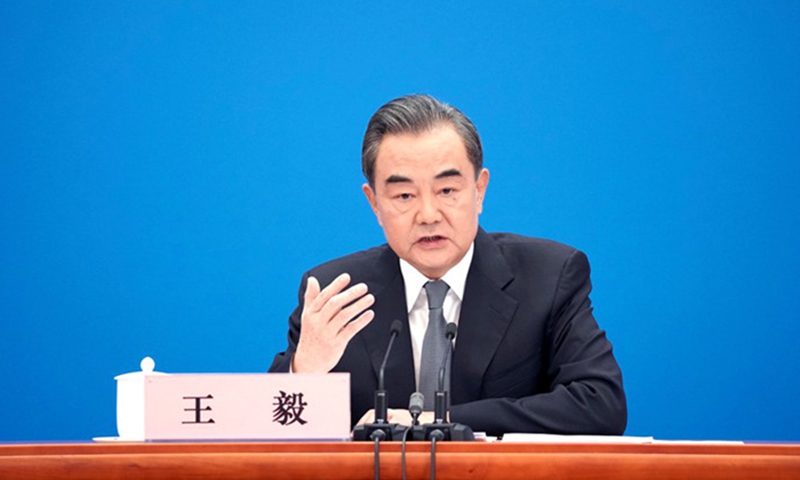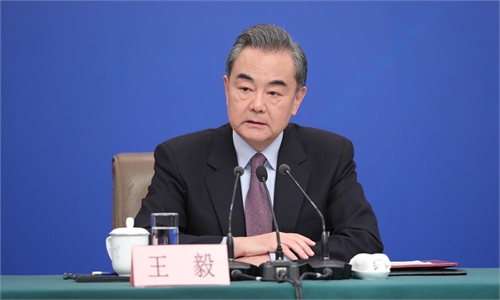
Chinese State Councilor and Foreign Minister Wang Yi File Photo: Xinhua
At a special G20 summit on Tuesday to discuss Afghan issues, China called for joint and swift efforts to help Afghanistan avoid looming crises and urged countries that have caused the current predicament in Afghanistan to learn the lessons and assume their responsibilities.
Chinese President Xi Jinping's special representative Wang Yi, also Chinese State Councilor and Foreign Minister, attended the extraordinary G20 leaders' summit on the Afghanistan issue via video link on Tuesday.
"Today's Afghanistan is at the crossroads of the rise and fall of governance, and there is still a long way to go to achieve peace and stability," Wang said at the meeting.
"The past 20 years in Afghanistan have once again suggested that the right path is always to respect each other's choice of development path, and mutual tolerance for different civilizations," Wang noted, adding that imposing ideology on others will only bring chaos and poverty that will lead to serious humanitarian disasters.
Wang urged G20 members to contribute to the peaceful development of Afghanistan on the basis of respect for its sovereignty, independence and territorial integrity.
Wang put forward four proposals at the meeting, including putting people first and helping Afghanistan to overcome the humanitarian crisis; encouraging Afghanistan to move toward inclusive development; holding a zero-tolerance attitude to terrorism, and pushing for joint efforts with a consensus toward helping Afghanistan.
Wang noted that countries that have caused the current predicament in Afghanistan should learn the lessons and take responsibility to help avoid a humanitarian and refugee crisis.
Countries that still impose unilateral sanctions should lift them, and international financial organizations should increase financial support for Afghanistan's poverty alleviation and infrastructure construction.
The international community should also build a united front to fight terrorism, abandon double standards and avoid Afghanistan falling into the role of being a shelter and hotbed for terrorism.
Wang noted that China is implementing its commitment of emergency aid worth 200 million yuan ($0.31 million) and the first batch has arrived in Afghanistan.
The virtual meeting was hosted by Italian Prime Minister Mario Draghi, the rotating president of the G20. US President Joe Biden, Indian Prime Minister Narendra Modi and Europe's G20 leaders also took part.
"The summit's focus points include urgent humanitarian support for the Afghan population, the fight against terrorism, freedom of movement inside the country and open borders," Draghi's office said in a brief statement, Reuters reported on Tuesday.
UN Secretary General Antonio Guterres joined the summit, according to the report, highlighting the central role given to the UN in dealing with Afghanistan.
However, no major consensus is likely to be reached at the summit, experts believe.
For one thing, Russia and China are opposed to Western countries' attitudes in settling the Afghan issue. "They want to set some preconditions for their assistance, for example, asking the Afghan Taliban to meet certain requirements in regard to the political system, religious policy, and policies on women's and children's rights, before they provide any actual aid," Wang Jin, an associate professor at the Institute of Middle Eastern Studies of Northwest University, told the Global Times on Tuesday.
Zhu Yongbiao, director of the Center for Afghanistan Studies in Lanzhou University, held a similar view, noting that the meeting's form is heavier than its content.
Zhu said that although there are common concerns in terms of refugees and the Afghan Taliban's commitments in safeguarding national security, countries' views on core issues are very different - such as, with regard to its humanitarian crisis, how many refugees each will take, the amount of aid to be provided, and recognition of the Taliban.
While few actual results will emerge, observers believed the meeting is more a case of showing the moral image of developed countries, to express their concern for the regional hot issue. Another practical purpose for holding the meeting is that, if the Afghan issue is not dealt with properly and promptly, more Afghan refugees will continue to flee to Europe, which is a consequence they do not want to see, Wang noted.
The major challenges that Afghanistan faces are international recognition, a socioeconomic crisis, and security threats, and these problems are intertwined, analysts explained.
"What the world should do right now is to address the country's humanitarian crisis, to provide it with the amount of aid promised at the United Nations Refugee Agency, to which a pledge of over $1 billion was made for Afghanistan," Zhu told the Global Times on Tuesday, noting that Western countries had failed to entirely fulfill their promises over previous years.
At the meeting, Guterres said that banks in Afghanistan are running out of money, civil servants have not been paid and food prices have soared.
"The crisis is affecting at least 18 million people - half the country's population," Guterres said.
China will provide Afghanistan with 200 million yuan ($31 million) worth of grain, winter supplies, vaccines and other medicine in line with the needs of the Afghan people, Wang Yi said in early September during a meeting with foreign ministers from Afghanistan's neighboring countries, just one day after the Afghan Taliban announced a new interim government.
It included a donation of 3 million doses of COVID-19 vaccines to the country and a promise that China will continue to provide more material and technical support.


